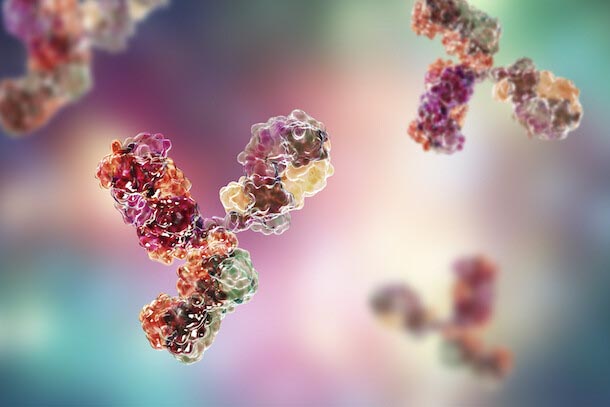
With a new grant from the National Institute for Innovation in Manufacturing Biopharmaceuticals, Penn State researchers aim to reduce the manufacturing costs of monoclonal antibodies. IMAGE: ISTOCK/@DR._MICROBE
Researchers earn grant to investigate how to reduce costs of antibody therapies
6/21/2021
By Gabrielle Stewart
UNIVERSITY PARK, Pa. — Monoclonal antibodies, medications made from genetically engineered mammalian cells, can help treat a variety of conditions, including cancer, autoimmune diseases such as rheumatoid arthritis and Crohn’s disease, and even COVID-19. They can also be prohibitively expensive to produce, according to Penn State researchers. Now, with a $350,000 grant, the researchers aim to address these high manufacturing costs.
“There’s a huge global need to drive down the cost of manufacturing for these products,” said Andrew Zydney, Bayard D. Kunkle Chair and professor of chemical engineering. “The typical price can vary based on drug and application but tends to be around $50,000 a year to treat just a single patient. If they’re going to fulfill their potential benefit, these drugs have to get less expensive.”
The grant, awarded by the National Institute for Innovation in Manufacturing Biopharmaceuticals (NIIMBL), will support 18 months of research at Penn State, led by Zydney, and Rensselaer Polytechnic Institute, led by principal investigator Todd Przybycien.
Antibodies are naturally occurring proteins that target specific substances — from the SARS-CoV-2 virus to inflammatory immune cells — and bind to them to prevent further cell activation. In a conventional monoclonal antibody manufacturing process, manufacturers introduce the DNA sequence that codes for the antibody of interest to genetically engineered cells, enabling them to produce large amounts of the desired antibodies.
“The underlying principle of all antibodies is similar,” said Zydney, who is also a co-principal investigator on the project. “They’re binding agents and can be tuned to bind to almost anything.”
The cells, however, produce a wide range of other proteins as well as DNA and cell debris alongside the antibodies. These components must be removed from the therapeutic monoclonal antibodies before they can be safely administered through injection or intravenous infusion.
One of the steps in the conventional purification process is the use of affinity chromatography. This technique involves binding a synthetic protein to porous particles packed into large columns. The antibody solution is pumped through the column, and the antibodies attach to the particles while unneeded components are washed away. A single column can easily cost more than $10 million, Zydney said, which drives up the cost of production for the monoclonal antibody.
“We are looking to replace the most expensive step in the process,” Zydney said. “And we will convert what was a batch operation into a continuous process, which allows the same equipment to produce 10 times as much product.”
The new method, based on previous research led by Zydney, adds small molecules to the solution that bind with the antibodies to make them insoluble. Once the solution is filtered, removing the impurities, the antibodies can be re-dissolved for final purification and therapeutic administration.
Researchers at Rensselaer will aim to optimize the precipitation process, while the Penn State team will focus on purifying the re-dissolved antibodies and subsequent steps. The universities will work with several industry partners to expedite the research process and provide realistic solutions for antibody manufacturing challenges.
“We hope that this collaborative involvement will not only accelerate the project timeline but will also ensure that the work we do effectively addresses the key questions that manufacturing companies have,” Zydney said. “Ideally, at the end of the project, companies can take what we learn and move forward with implementing these ideas in their manufacturing processes.”
Collaborators include AstraZeneca, Chromatan, Janssen Pharmaceuticals, Merck & Co., Takeda Pharmaceuticals and MilliporeSigma.



